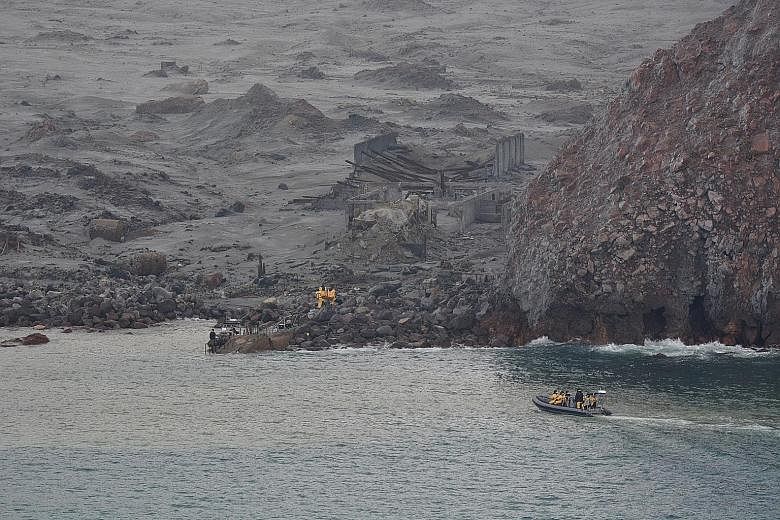WHAKATANE (New Zealand) • Elite soldiers retrieved six bodies from New Zealand's volatile White Island volcano yesterday, winning praise for a "courageous" mission carried out under the threat of another eruption.
At first light, two military helicopters set off from Whakatane airport for the offshore volcano, where an eruption on Monday killed at least 16 people and severely injured dozens more.
The goal of the team from the country's bomb disposal squad was to recover the remains of eight people still on New Zealand's most active volcano, which sits semi-submerged 50km out to sea.
After a tense four-hour wait, and as vulcanologists monitored live seismic feeds for signs of another explosion, police said most of the bodies had been safely airlifted to a naval frigate anchored off the coast.
"Those staff showed absolute courage in order to ensure those six people were returned to their loved ones," police commissioner Mike Bush told reporters.
He added that the soldiers were operating in an "unpredictable and challenging" environment.
He said efforts to locate the two remaining bodies were continuing, with divers searching nearby waters after a corpse was seen floating in choppy seas on Tuesday.
Helicopters were also searching over the Bay of Plenty, and Mr Bush did not rule out a return to the island when conditions were safer. Drone flights had helped locate the six bodies on the caldera before the operation began and the six-strong team laboured to reach them in heavy hazmat suits and breathing gear that restricted movement.
Special forces commander Rian McKinstry said he was "incredibly proud" of the team, who had to deal with heat stress as they prepared the bodies to be airlifted out.
"It was a unique operation, but unique operations are what organisations like the Explosive Ordnance Disposal Squadron gets involved in," he said.
As the military began its grim task, police took grieving families out near the volcano on a boat to perform a Maori blessing and locals chanted karakia, or prayers, on the shore as the island smouldered in the distance.
Despite the risk of an eruption inside 24 hours being put at 50-60 per cent, Prime Minister Jacinda Ardern said those involved wanted to help the grieving families.
"Today was all about reuniting them with their loved ones," she said, revealing she was on tenterhook for the four hours the military team was on the volcano.
"I felt the same anxiety that I imagine everyone did at that point," she told reporters.
Many of the tourists who died on the island were Australians, and the country's Foreign Minister Marise Payne said they had been affected by a catastrophic event.
"This is a time of absolute desperation and distress, and to every single one of those families and their friends and their loved ones, our hearts go out at this extraordinarily difficult time," she said.
The bodies on the island are thought to include New Zealand tour guide Hayden Marshall-Inman. His brother, Mark Inman, had epitomised relatives' frustration over stalled recovery efforts, criticising "red tape, bureaucracy". But yesterday, he praised the daring recovery, saying: "It's going to allow us to grieve and send our loved ones off in the manner they deserve."
The recovery had been on hold for days as poisonous gases continued billowing from the volcanic vent and the island remained blanketed in a thick layer of acidic ash.
While troops were recovering the bodies, another 28 people were still being treated in hospitals across New Zealand and Australia, many in a critical condition after suffering severe burns. A coronial process has begun to identify those confirmed dead but police have said it could "take some time".
White Island is a popular tourist destination off the northern coast of New Zealand's North Island.
AGENCE FRANCE-PRESSE

